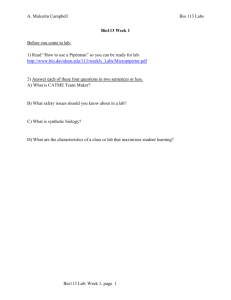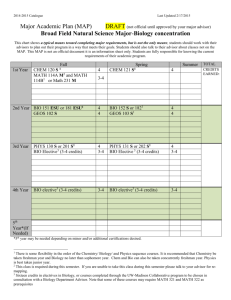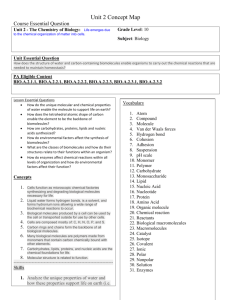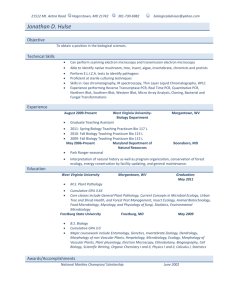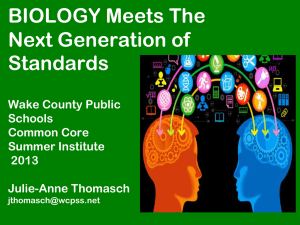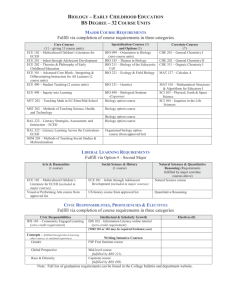Science-centred competitions to improve student motivation
advertisement
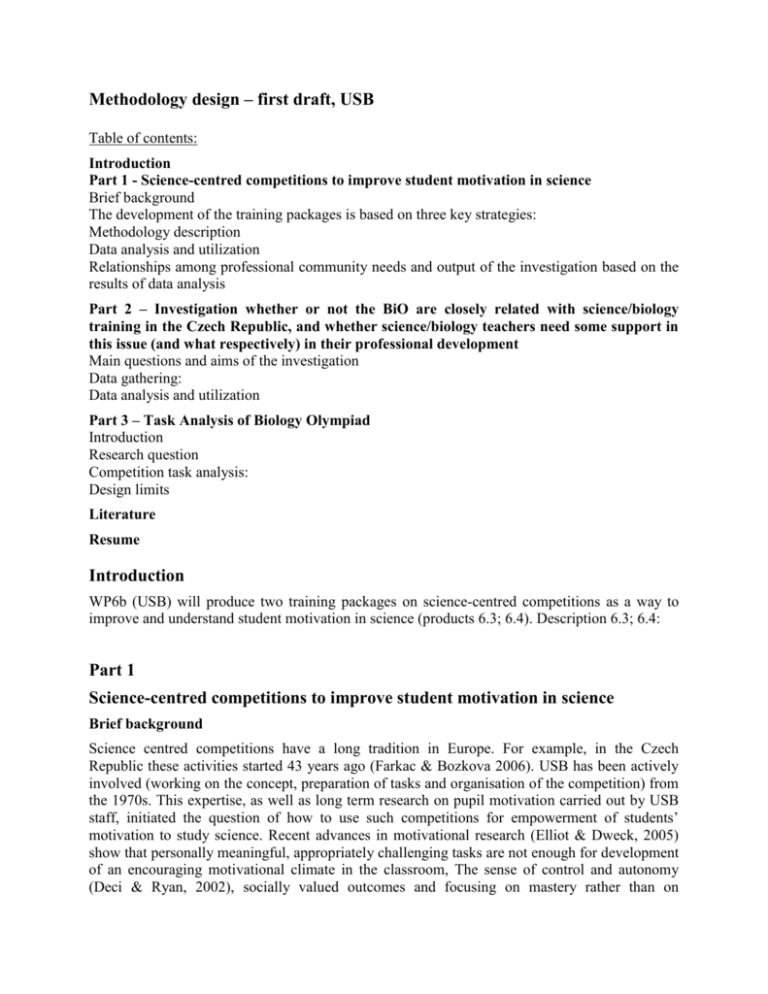
Methodology design – first draft, USB Table of contents: Introduction Part 1 - Science-centred competitions to improve student motivation in science Brief background The development of the training packages is based on three key strategies: Methodology description Data analysis and utilization Relationships among professional community needs and output of the investigation based on the results of data analysis Part 2 – Investigation whether or not the BiO are closely related with science/biology training in the Czech Republic, and whether science/biology teachers need some support in this issue (and what respectively) in their professional development Main questions and aims of the investigation Data gathering: Data analysis and utilization Part 3 – Task Analysis of Biology Olympiad Introduction Research question Competition task analysis: Design limits Literature Resume Introduction WP6b (USB) will produce two training packages on science-centred competitions as a way to improve and understand student motivation in science (products 6.3; 6.4). Description 6.3; 6.4: Part 1 Science-centred competitions to improve student motivation in science Brief background Science centred competitions have a long tradition in Europe. For example, in the Czech Republic these activities started 43 years ago (Farkac & Bozkova 2006). USB has been actively involved (working on the concept, preparation of tasks and organisation of the competition) from the 1970s. This expertise, as well as long term research on pupil motivation carried out by USB staff, initiated the question of how to use such competitions for empowerment of students’ motivation to study science. Recent advances in motivational research (Elliot & Dweck, 2005) show that personally meaningful, appropriately challenging tasks are not enough for development of an encouraging motivational climate in the classroom, The sense of control and autonomy (Deci & Ryan, 2002), socially valued outcomes and focusing on mastery rather than on performance are essential. Upward comparison can improve the level of accomplishments (Collins, 2000). These attributes are especially fostered by the competition tasks and the inquiry centred competition context. The development of the training packages is based on three key strategies: 1. to collect data about the students’ motivation to engage in science-centred competition (Biology Olympiad) and about development of their science interest. These classroom and extra-curricular data will be presented in the training package to improve teachers’ understanding of students’ intrinsic motivation development and shed light on the role that competitions can play in fostering the students’ interest in science. 2. to collect the data from the biology teachers to specify more exactly what they need to learn in order to use the Olympiads more efficiently in their classes to advance students’ interest in biology 3. to analyze a series of available tasks used in science centred competitions from the motivational point of view (understanding extrinsic motivation) Methodology description Students’ motivation to engage in the Biology Olympiad and development of their science interest will be studied in two steps. The first, screening step will be based on school-level competition. Approximately twenty interviewers will speak to approximately 100 students in their schools and ask them about their motives for prospective participation in the BiO and about prospective incentives from the teacher, school or school community, and family that could foster their willingness to take an active part. The interviews will be recorded and analyzed using a grounded theory paradigm. The results will be reviewed by three teachers and headmasters to evaluate the importance of the constituent findings for teachers’ procedural knowledge in how to nourish the students’ interest in science. The second step aims at gaining in-depth information about the development of student motivation and interest. Here the active participants, who have taken part for several subsequent years and are successful at the regional level of competition, will be interviewed and their motivational structure will be explored. A narrative developmental perspective will be used to track the growing interest and effort the student invests in science. Besides collecting narrative data, so-called critical moments technique will be used to explore the key situations, usually emotionally laden, in which the attitude toward or interest in science has developed significantly (these situations are frequently related to mastering some difficult problem or topic, to success, to pride in what science has offered humankind, etc., but also to the teacher introducing the topic, and his or her professional actions). The recording of the interview will be analyzed both from the psychological and scientific point of view and the key points will be summarized. This qualitative data will be interconnected with the students’ motivational structures. We will search for both implicit motive tendencies achievement, affiliation, power (Multi Motive Grid – MMG. Sokolowski et al, 2000) and their goal orientation (Patterns of Adaptive Learning Scale; Midgley et al., 2000) and current and future goals (Personal Concerns Inventory; Cox & Klinegr, 2004; Stuchlikova & Man, 2007). The relation of students’ narratives to their motivational structure will be studied using category analysis. The students’ motivation data will provide valuable information which will be presented in the training package to deepen the teachers’ understanding of conditions and teaching practices which could utilize science competition to boost students’ intrinsic motivation. The organizational aspect of science olympiads is well developed but pedagogical and psychological background has not yet been fully utilised to improve students’ motivation for science. The design of the data collection as well as the implementation of the outcomes in the development of the training package is consistent with, and will supplement, the current motivational literature (Urdan & Turner, 2005) Part 2 Investigation into whether or not the BiO are closely related to science/biology training in the Czech Republic, and whether science/biology teachers need some support and professional development on this issue Main questions and aims of the investigation All schools in the Czech Republic regularly take part in the scientific competition BiO. It is an open competition organized in four divisions for pupils of different ages. Competitors are mainly motivated and talented pupils but access by all pupils is possible. BiO is organised and pupilcompetitors are prepared and trained mainly by science/biology teachers in individual schools. Evidence shows that BiO, which consists of a series of different and interesting tasks every year, could serve as an important source of inspiration for inquiry-based science education (IBSE) as well as a resource for preparation of IBSE lessons. There are several main questions related to this theme. (i) Do teachers consider BiO as a linked activity with science/biology training or as separate activity? (ii) Does the BiO also offer teachers a source of inspiration for science/biology training? (iii) Do teachers know how to transform selected BiO tasks into pupils´ motivation and lessons useful for IBSE? (iv) What are teachers’ needs in this area? (v) Are there differences in BiO utilization for support of IBST/E that depend on the gender of the teachers? We want to collect data that could clarify and answer these questions. Sampled data will be used to identify teachers’ needs in this area and to prepare a publication (monograph/textbook) and training package for use by teachers (in South Bohemia and/or Czech Republic respectively) and science/biology education students (in USB and elsewhere). Both publication and package will be focused on the development and/or improvement of skills to link the BiO with IBST/E and utilize the BiO as one of the sources of teachers’ inspiration for support, creation and development of inquiry-based lessons. Data gathering: Data will be compiled after personal discussions with science/biology teachers using a questionnaire which will include the following items: What is your opinion on the use of IBST/E in science/biology instruction? Are you inspired by some aspects of the BiO in your preparation of pupils’ science/biology instructions? If so, in what area (motivation, creation of experiments, demonstrations, practices, IBST/E lessons)? If so, in what exactly (give examples)? If not, why not? If so, do you actively search through BiO tasks for inspiration? Questions only for teachers (groups of informants i and ii, see below) are marked in grey: If so, do you actually utilize some aspects of the BiO for preparation of pupils’ science/biology instructions? If so, in what area (motivation, creation of – experiments, demonstrations, practises, IBSE lessons)? If so, in what exactly (give examples)? If so, approximately what volume of your instructions is formed by such IBSE lessons? What are the main barriers for the utilization of BiO to increase pupils’ motivation in science/biology education? What are the main barriers for the utilization of BiO tasks for the creation of IBSE lessons in your opinion? What are the main barriers for an increase in the implementation of such IBSE lessons in your classroom instructions in your opinion? Which topics relating to BiO would you suggest for the undergraduate curriculum or postgraduate education and professional development of science/biology teachers? Which topics dealing with BiO utilization for IBSE implementation would you suggest for the undergraduate curriculum or postgraduate education and professional development of science/biology teachers? We will address three groups of informants: (i) science/biology teachers whose pupils are successful in BiO; (ii) science/biology teachers without experiences of pupils training for BiO; (iii) USB students of science/ biology teaching who are helping with the BiO organization in the region of South Bohemia. Answers will be collected anonymously by video- or audio recorder. Only the gender of informant, his/her division (see above – i, ii, iii) and age will be noted. Data analysis and utilization Assembled answers will be sorted by groups and gender of informants and quantitatively and qualitatively analyzed. The content of the answers will also be simplified/generalized and categorized by quantification (quantitative ordered characters). Differences between answers of individual groups will be tested by X2 test. When significant differences are found, they will also be compared by Gehan-Wilcoxon test (comparison within particular groups and sexes). Relations of answer types to groups and sex of informants will be processed by ordination analysis (most probably RDA). All tests will be run with the software STATISTICA for Windows. Results of the content analysis (especially in the case of the last five questions – see above) together with results of analysis of BiO tasks (see last subchapter) will be used for: (1) the formulation of hypotheses and conclusions affecting future research and implementation of IBSE in science/biology education (at least in the Czech republic), (2) changes in science/biology teachers professional curriculum (at least in USB), (3) step by step creation and preparation of a training package based on the utilization of BiO sources, that will support and improve IBST/E. Relationships among professional community needs and output of the investigation based on the results of data analysis There are strong relationships among (a) the professional community (represented by groups of informants) from which the data will be assembled, (b) its particular local needs and (c) the area on which the training package will focus. This issue (relation between BiO and IBSE implementation in science/biology instructions or BiO utilization for IBSE respectively) will be investigated in the Czech Republic for the first time. Additionally it will be a first attempt at creating and preparing an IBSE training package based on aspects of BiO in the Czech Republic. Part 3 Task Analysis of Biology Olympiad Introduction The BiO is a competition designed for pupils of secondary school level and students of high schools. There are four categories A, B, C, and D for the last 8 years of education (A 7-8, B: 5-6, C: 3-4, D: 1-2). The first stage (school level) and the second stage (regional level) of competition contain three categories of tasks – (a) written tests, (b) theoretical and practical laboratory tasks and (c) the determination of living things. Part (b) is interesting for WP6 and it can demonstrate different approaches toward science education (in biology) and inquiry. There are many and varied tasks such as: - elementary questions focused on biology knowledge (terminology, knowledge of biology of organisms etc) - tasks oriented at discovering relations among phenomena - theoretical comprehension tasks where analysis / synthesis or induction / deduction are expected - practical laboratory tasks focused on the application of methodology together with concrete biological matter The competition starts in January at school level and continues during the spring months to the national level which is held annually in May. The International Olympiad is held in July. Research question Basic research questions: Is it possible to use the Biology Olympiad as a tool for the improvement of science literacy not only in the case of gifted young people but also in general? Are there any relations between science competitions and IBST/E and is it possible to support IBST/E via science competitions such as the BiO? Component questions: During the research for the general questions we expect to answer the following component questions: What is the success of individual types of tasks? The task typology is more important than the concrete special content of tasks in this case. Are there any specific tasks which are difficult for pupils? In this case that means searching for the possible reasons for false task solution (e.g. educational system, content of curricula, motivation, teachers etc.) Which tasks support IBST/E the most? Does the success of task solutions develop over time? If such development exists, how far does it correlate with the results of PISA or TIMSS which indicate a downturn in pupils’ science knowledge and skills. Do competitors' results show up weak or strong points in the science education system especially regarding IBST/E? In which ways do competitors’ results indicate the state or the development of science competencies of pupils? This is mainly concerned with planning skills, setting or using the solution method, formulation of conclusions, interpretation of the results and documentation skills. How the tasks relate to the curricula and how the pupils are ready for these tasks in accordance with school science education. In this situation the results of average pupils/competitors are the most important for the research rather than the results of the best competitors whose higher skills and above-average knowledge are expected. The case studies can be developed via task analysis and can demonstrate specific problems of science education. The analysis of competitors’ protocols at the regional level of the Biology Olympiad will be the basic research method. This method of acquiring data may be supported by the observation of competitors’ work directly in the process of competition in years to come. The protocols will be analysed from several points of view: - Content analysis – how selected tasks correlate with IBST/E or curricular documents; how problem-solving relates to IBST/E? - Mistakes analysis – is it possible to generalize and to analyse the error rate on a selected level of a competition with semi-quantitative methods; what do mistakes predict? - Time analysis – searching the development of results from similar tasks during last 10-12 years. Why analyse data at the regional level of competition (BiO)? - the competition runs under relatively standard conditions – uniform task assignment, skilled evaluative committee, centrally supplied material for laboratory tasks, skilled selection of living things for recognition or determination etc. - complete protocols of this level are available for the past 10 – 12 years - we participate in the organization at regional level and we work in the regional committee of the competition - basic (school) level competitions may not be standard due to possible non-standard conditions (pupils’ preparation for the competition, school’s equipment, school’s specialization etc.) - at the national level advanced competitors compete with deep knowledge and strong motivation for the competition – from the point of view of general scientific literacy it is not an optimal sample of competitors. Competition task analysis: - the task analysis will not be general – concrete tasks will be selected for the purpose of the project. The tasks will be chosen mainly regarding the relation to IBST/E - the choice of similar tasks over the time period (time difference of 10 years) - the analysis of protocols can be supported with observation and other factors which are not in the protocols (e.g. laboratory skills of competitors, organization and design of laboratory tasks, …) - How do the competitors manage laboratory techniques and do they use scientific methods? The information can be a useful source of knowledge of how inquiry methods are used in science education. Is the level of education adequate from the point of view of the IBSTE? The competitors at the regional level are probably a good research sample because they are interested in biology and when they have a problem with inquiry or scientific methods this can indicate some problems in science education. - also little things such as the quality of biological drawing, writing of observation protocols, etc. can be helpful as indicators - how pupils (competitors) use logical, synthetic, deductive or inductive thinking in the course of tasks solution Design limits About 30 – 40 competitors´ protocols are available at every relevant level and every year of the competition. We estimate that for a semi quantitative data analysis this is an adequate amount of data. For some tasks the observation of competitors’ work is probably necessary, because protocols alone cannot be sufficient. There can be some problems with the relationship between competition and curricula because different Educational Programmes exist in schools. Resume The training package will be used in pre-service or in-service teacher training. The analysed tasks will be used as case studies. We expect that this training package is useful not only for work with gifted youth but also for the improvement of science education in general. The final training package will be comprised of three parts: (i) case study of selected theoretical or practical tasks (ii) the analysis of teachers’ needs in implementation of science/biology competitions such as BiO in science education via IBST/E (iii) the study how science competitions improve student motivation in science. We do not have any relevant information or literature data from international research dealing with relationships between the utilization of BiO by science/biology teachers for IBST/E lesson creation and motivation of pupils during instruction. Literature Collins, R. (2000). Among the better ones: Upward assimilation in social comparison. In J. Suls & L. Wheeler (Eds.), Handbook of social comparison (159 – 172).New York: Kluwer / Plenum Press. Cox, W. M. & Klinger, E. (2004). Handbook on Motivational Counselling.Chichester: Willey & Sons. Deci, E. L., Ryan, R. M. (2002). Handbook of Self-Determination research. Rochester: University of Rochester Press Elliot, A. J., Dweck, C.S. (2005). Handbook of competence and motivation. New York: Guilford Press. Farkac, J., Bozkova, H. (2006) Biological Olympiad. Prague. Jan Farkac Publishing. (in Czech) Midgley, C. et al. (2000). Patterns of Adaptive Learning Scale, University of Michigan Sokolowski, K. Schmalt, H-D., Langens, T.A.,& Puca, M. (2000). Assessing achievement, affiliation, and power motives all at once: The multi-motive grid (MMG). Journal of Pesonality Assessment, 74, 126-145. Stuchlikova, I., Man, F. (20070. Motivational structure related to implicit motives. Invited symposium Implicit and Explicit Motivation II: Applied approaches. 10th European Congress of Psychology, Book of abstracts, s. 138, Union of Psychologists Associations of the Czech Republic Various authors: BiO – information and instructions for organizers and competitors, published in relevant volume of BiO.

